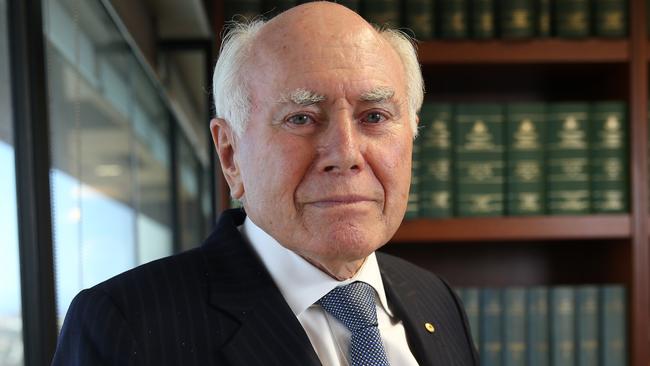‘Great policy tragedy’: John Howard on his failed plan to nationalise Murray-Darling Basin
The former Prime Minister describes the collapse of his $10bn plan to nationalise the Murray-Darling Basin in the final year of his government as a ‘great policy tragedy’.

John Howard has described the collapse of his $10bn plan to nationalise the Murray-Darling Basin in the final year of his government as a “great policy tragedy” that resulted in a missed opportunity to redefine Australia.
In his first detailed interview reflecting on the failed deal in 2007, the year he would be defeated at the federal election, the former prime minister revealed he believes the grand plan to buyout the state rights over the water source fell victim to cheap politicking from former Victorian Labor premier Steve Bracks.
“If the states had agreed to that, I think you would have had transformation,” Mr Howard said. “I think it’s a great policy tragedy that it never happened but of course going back 14 years, Rudd and Gillard had just taken over and they were the flavour of the month and my government was behind in the polls and all that sort of thing and people were not perhaps possessed of the desirability of something like that as they should have been.
“I think it was a wonderful opportunity squandered and it was squandered out of political calculation.”
The plan was bold, involved a huge expense by the commonwealth and required co-operation from the four Labor-held states.
In a speech to the National Press Club on January 25, 2007, Mr Howard broke the plan into 10 points. The first two were a nationwide investment in irrigation infrastructure to line and pipe major delivery channels, and a program to improve on-farm irrigation technology.
Mr Howard stressed the importance of point three — the sharing of water savings on a 50-50 basis between irrigators and the commonwealth, leading to greater water security and increased environmental flows.
The remaining points aimed for a new set of governance arrangements for the Basin, a sustainable cap on surface and groundwater use, major engineering works and expanding the role of the Bureau of Meteorology to provide better water data.
“The way you’ve got a better outcome with this is to clean up the over-allocation which obviously was a problem, do something about making the irrigation system more sustainable and more efficient, and end squabbling over running the basin,” Mr Howard said.
“You do that by handing it to the national government … it’s always bothered me that we couldn’t as a country get on top of some of the water problems, and some of it was very very bad administration over the years by governments of both persuasions.”
Mr Howard saw the pragmatic solution was for the commonwealth to “stump up the cash” and make the MDB a national asset.
In the end however, the plan fell short with senior political figures on both sides of the aisle pointing the finger at Mr Bracks.
“It was the last year as it turned out of my government and I don’t really think deep down the Labor Party at a national level wanted such a generous and attractive policy thing to be implemented … I think the upcoming federal election had something to do with the obstinacy of Victoria. I can’t prove that, I just make that comment,” Mr Howard said.
“It seemed to me, we were making an offer to the states that they could barely refuse and we were offering to pick up the bills for their mistakes and it wasn’t politically motivated in a party political sense because the overallocations occurred under different regimes and it’s the reluctance of Victoria to come on board that scuppered it.”
Then Queensland premier Peter Beattie was full of admiration for Mr Howard’s plan.
“He had leadership and he had vision on it,” Mr Beattie said. “I understand state politicians playing politics but there are times when you have got to look at the national interest.
“It needed national leadership and Howard provided it.”
Mr Beattie said he told his supporters that “Howard had guts” in putting forward a plan that would damage his own backyard base in the National Party.
“It is a national disgrace that we didn’t take up the whole package that Howard put up,” he said.
“The politics of this are just puerile.”
Then NSW premier Morris Iemma said: “I think I was the first of the state premiers agreeing, saying yes in principle. Peter (Beattie) followed not long after.”
“I thought why not have one layer of government responsible,” he said. “(Howard) was right on the money.”
Former South Australian premier Mike Rann and Tim Flannery called for national leadership on the Murray-Darling in 2003, but Mr Rann said the cry for reform was ignored by the Howard government because of the political clout that irrigators had within the Coalition’s rural base.
He said it was the millennium drought which pushed the Murray-Darling on to the federal agenda in late 2006. “The drought wasn’t the only motivation. A difficult federal re-election campaign was just a year away,” Mr Rann said.
“Drought politics was now not only a political issue in rural Australia. It was firmly on the national agenda.”
In Mr Rann’s view, “a ‘national’ approach didn’t just mean the commonwealth taking over” and would instead look more like last year’s national cabinet response to the COVID pandemic.
Former Victorian premier Steve Bracks did not respond to a request for comment.



To join the conversation, please log in. Don't have an account? Register
Join the conversation, you are commenting as Logout